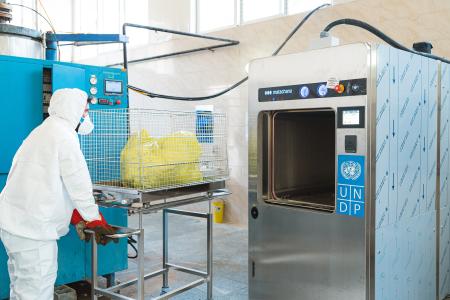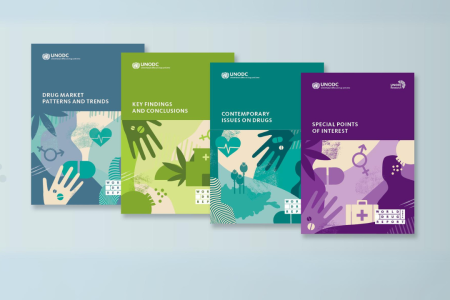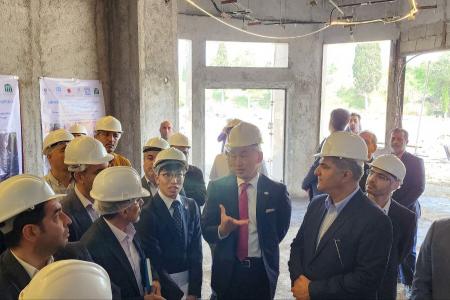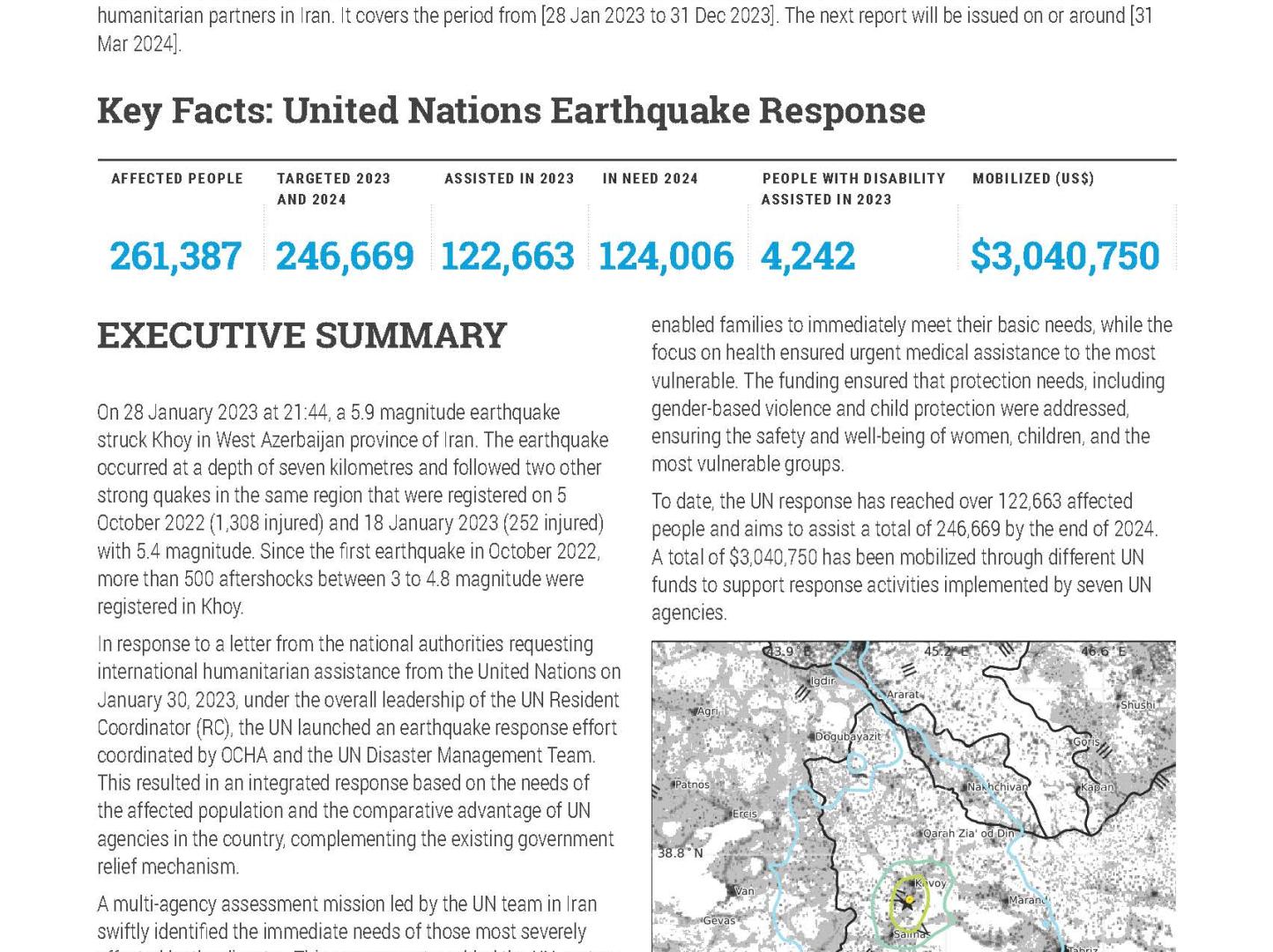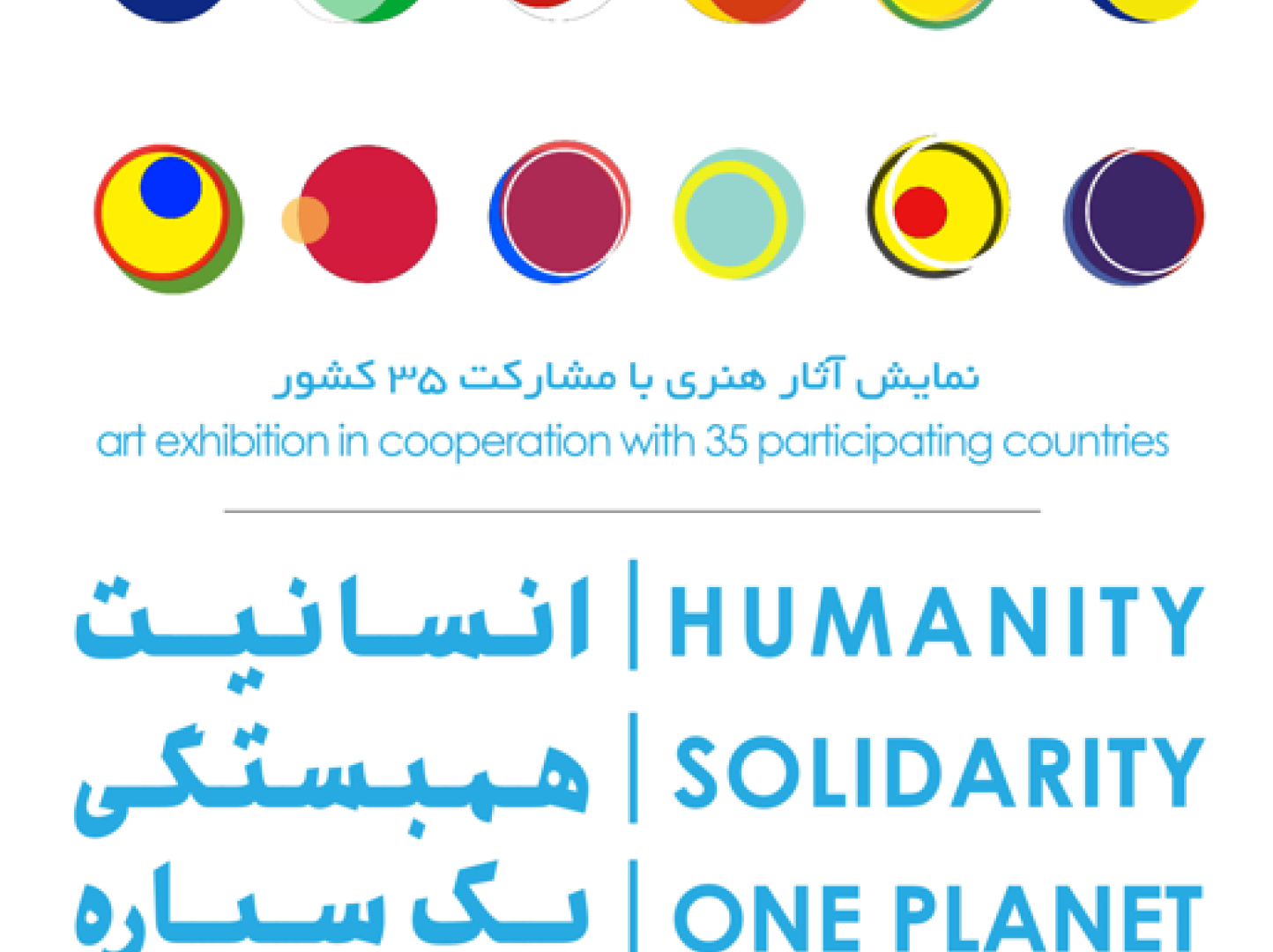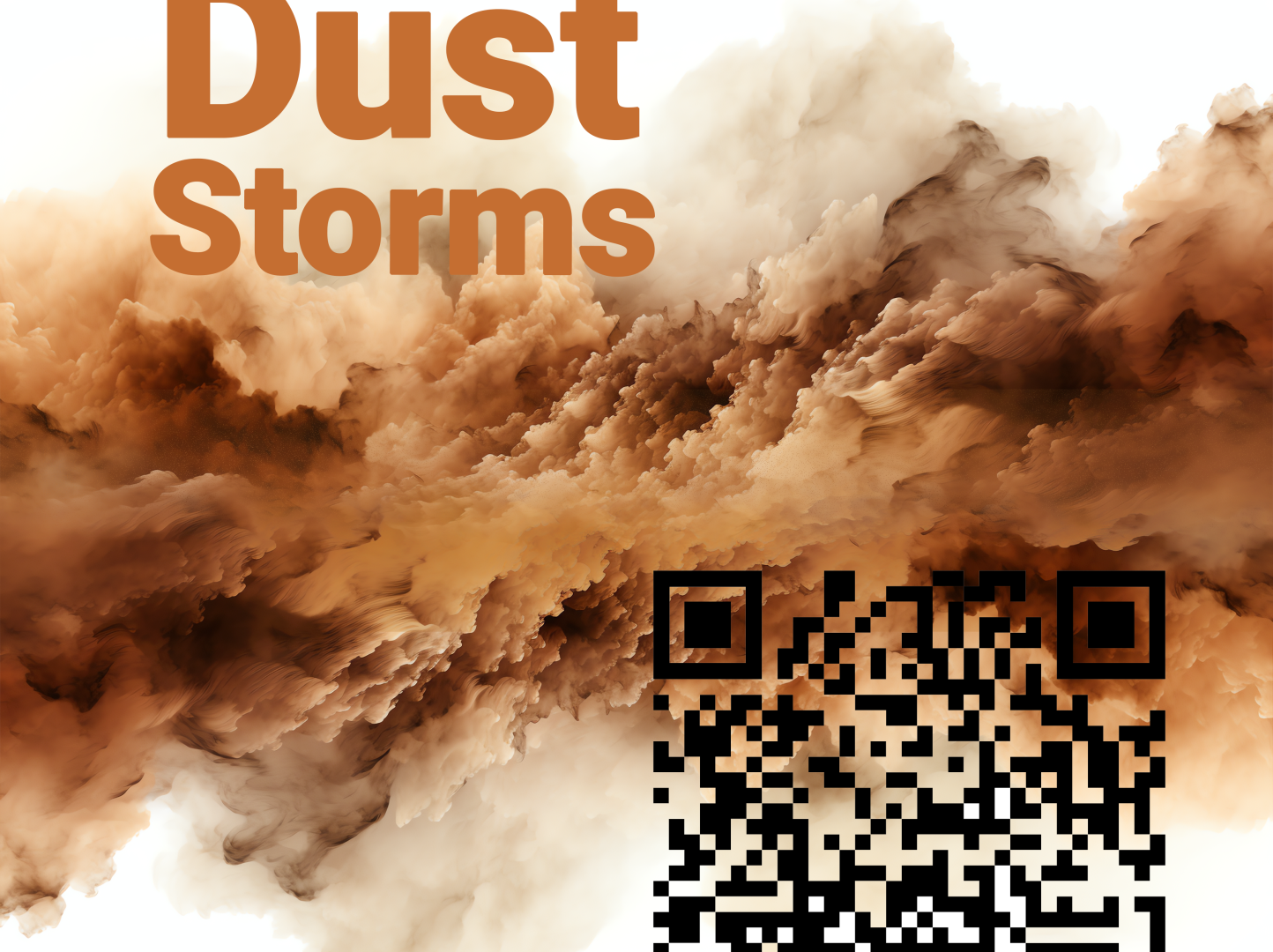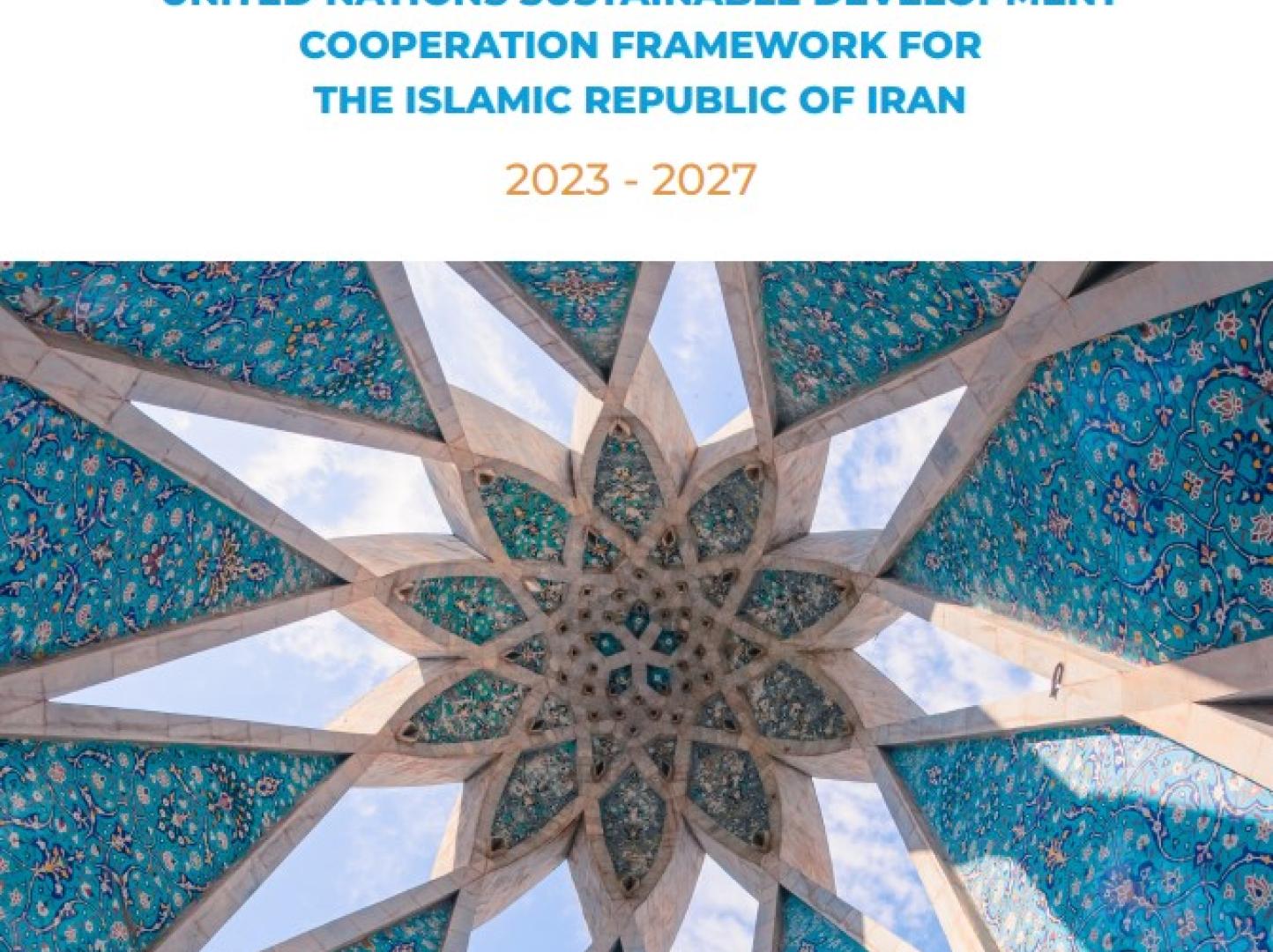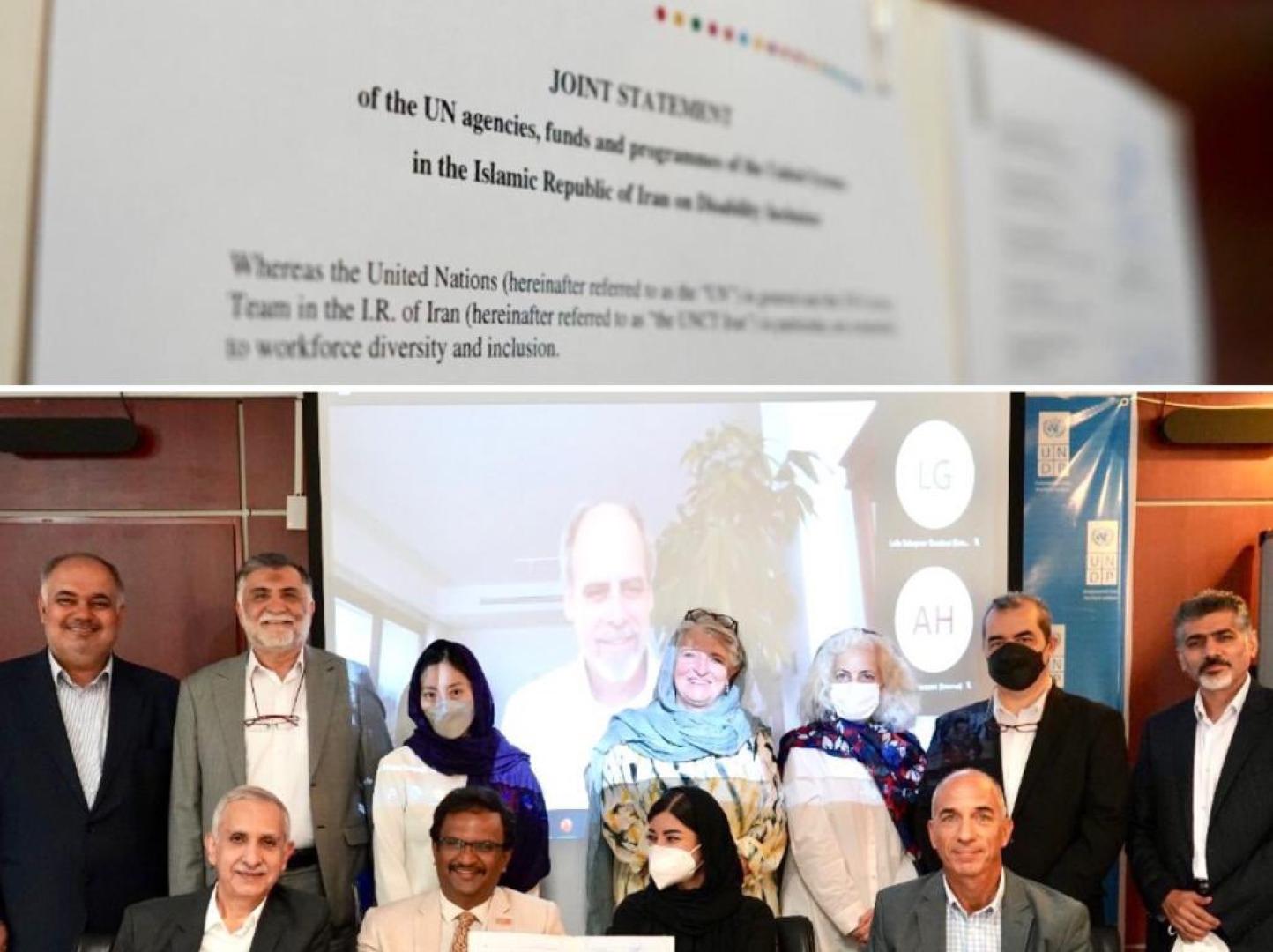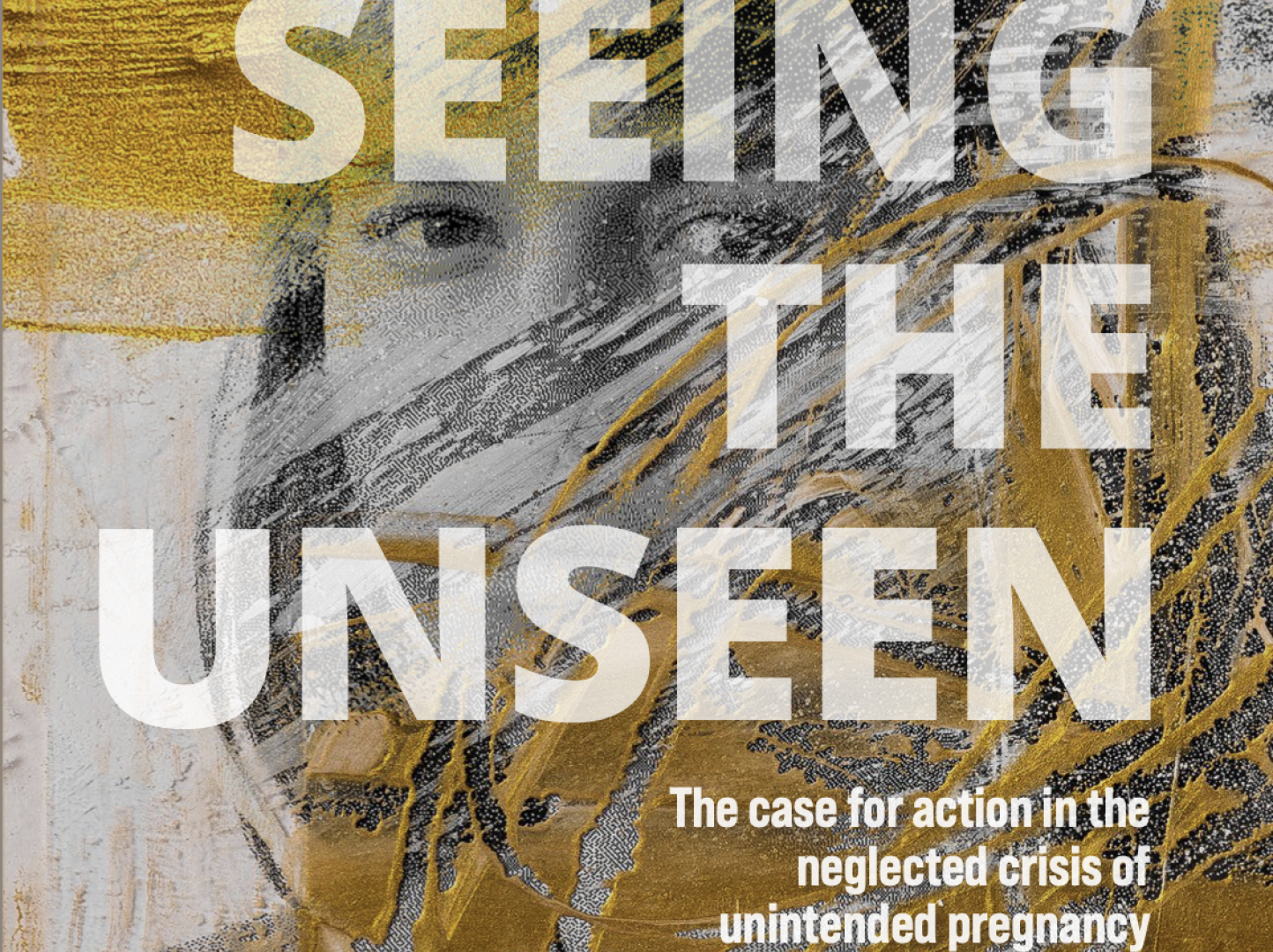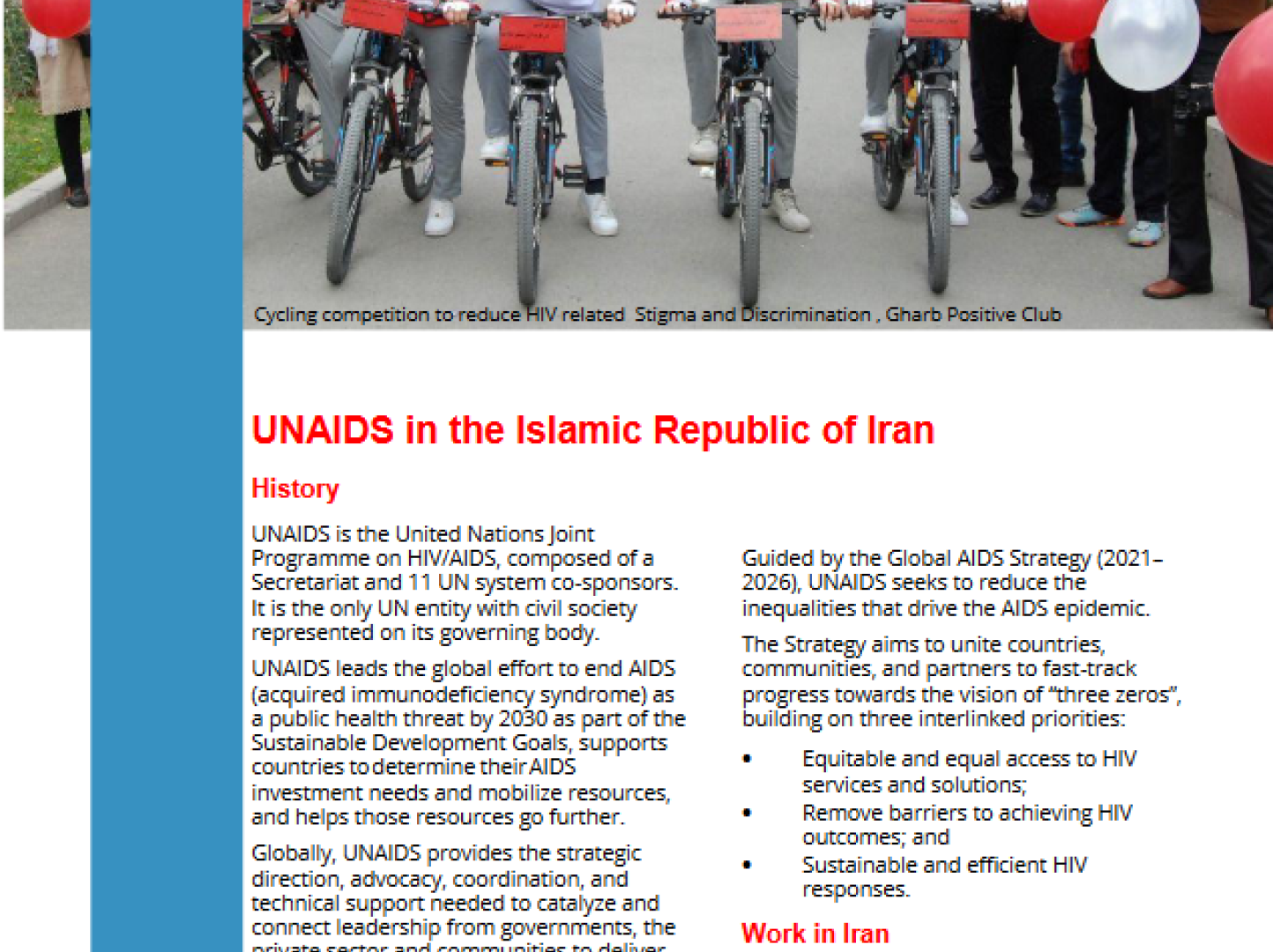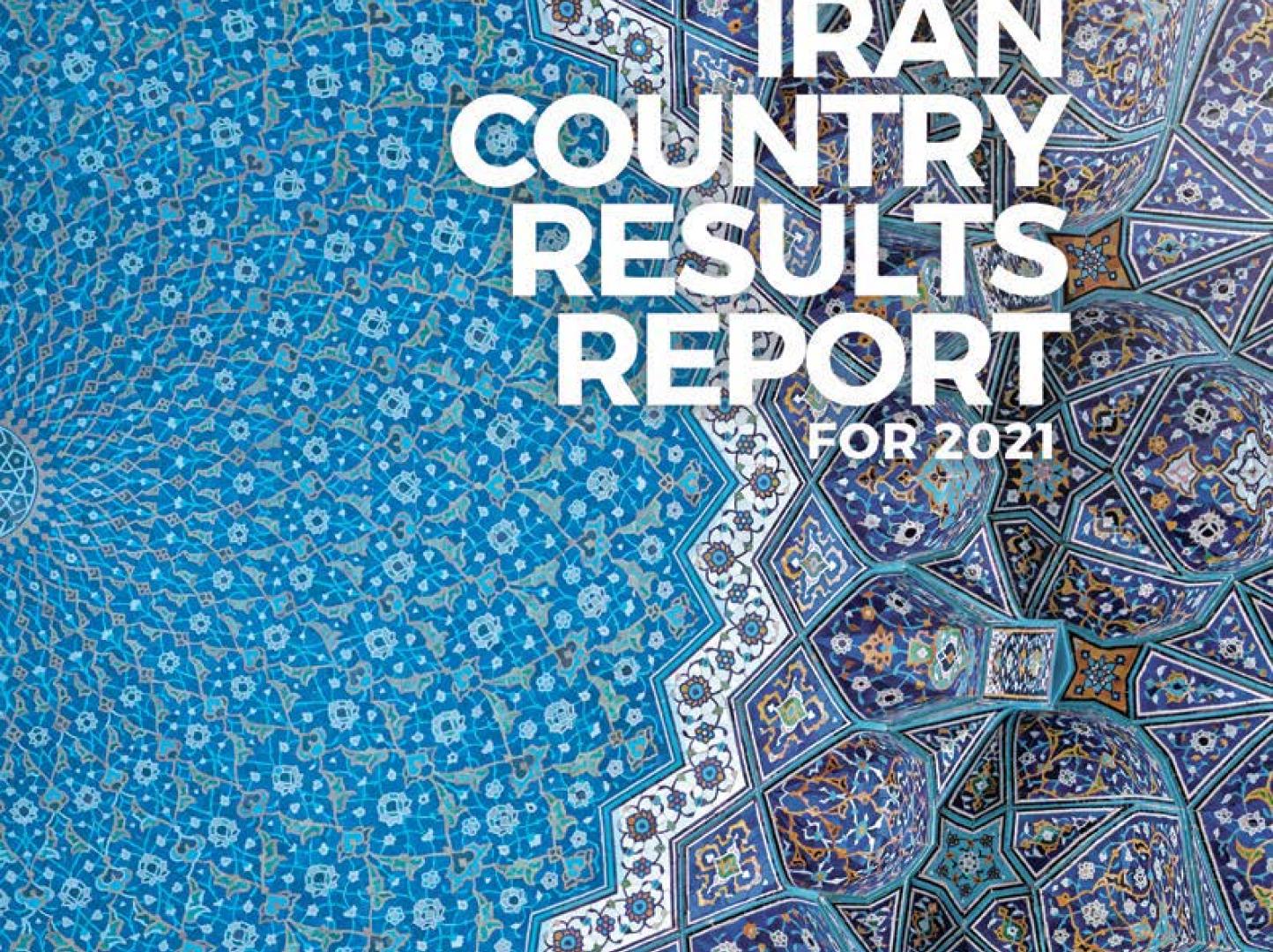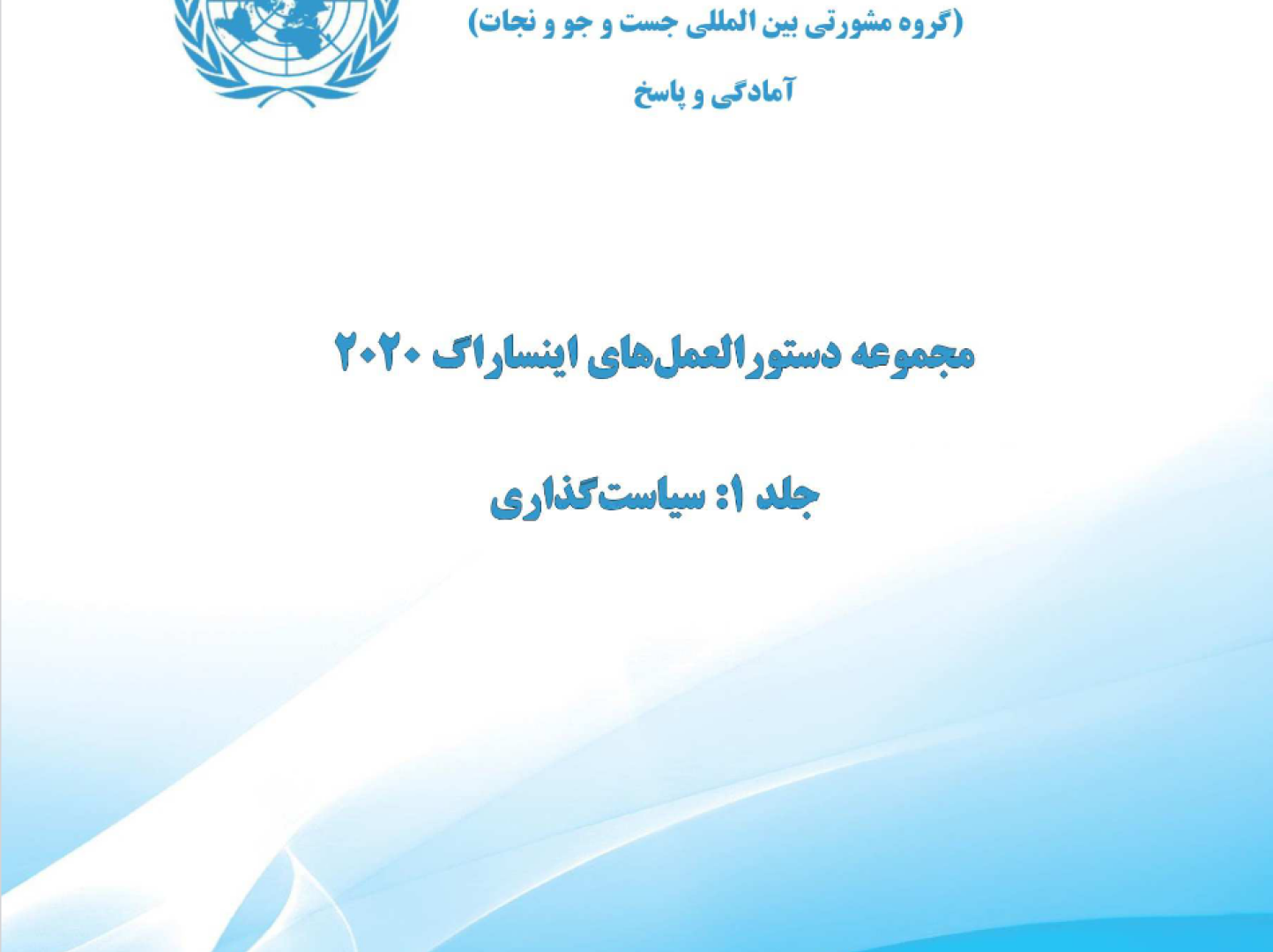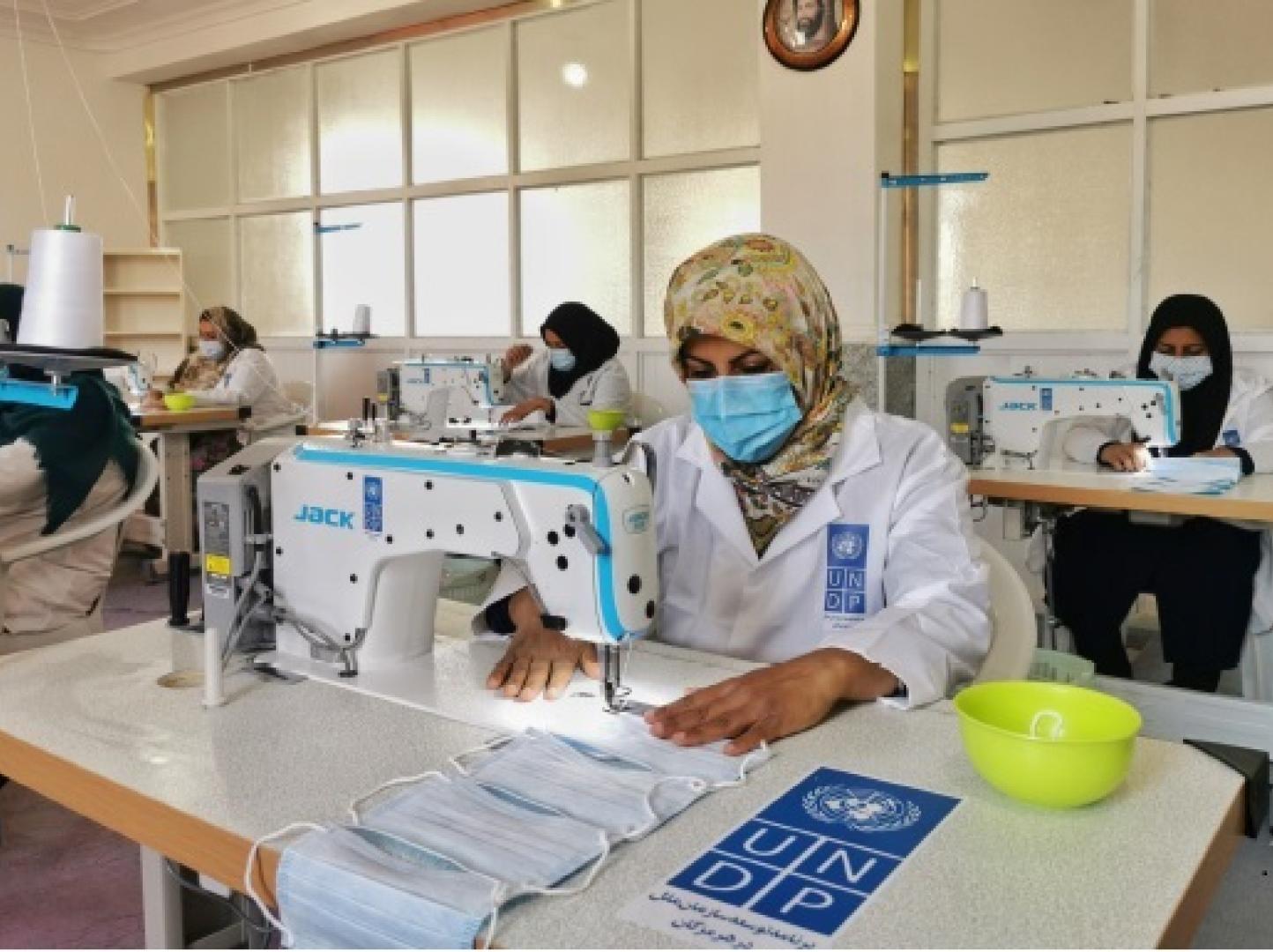Latest
Publication
07 February 2023
United Nations Sustainable Development Cooperation Framework (UNSDCF) for I.R.Iran 2023 - 2027
The United Nations Sustainable Development Cooperation Framework (UNSDCF) for 2023-2027 was developed jointly between the Government of the Islamic Republic of Iran and the United Nations System to reflect and support the national development goals and strategies. Starting in 2021, the United Nations Country Team in Iran engaged in consultations internally and with a wide range of national partners that identified the evidence base to prioritize development needs and opportunities for the UNSDCF. These consultations resulted in the vision for United Nations support to Iran’s development that is based on equitable, inclusive, resilient, and sustainable growth and development. Five strategic priorities that guide the work of the United Nations System in Iran in the coming years were identified: (a) socio-economic resilience; (b) public health; (c) environment; (d) disaster risk reduction and management; and (e) impacts of drug use and drug trafficking.
1 of 4
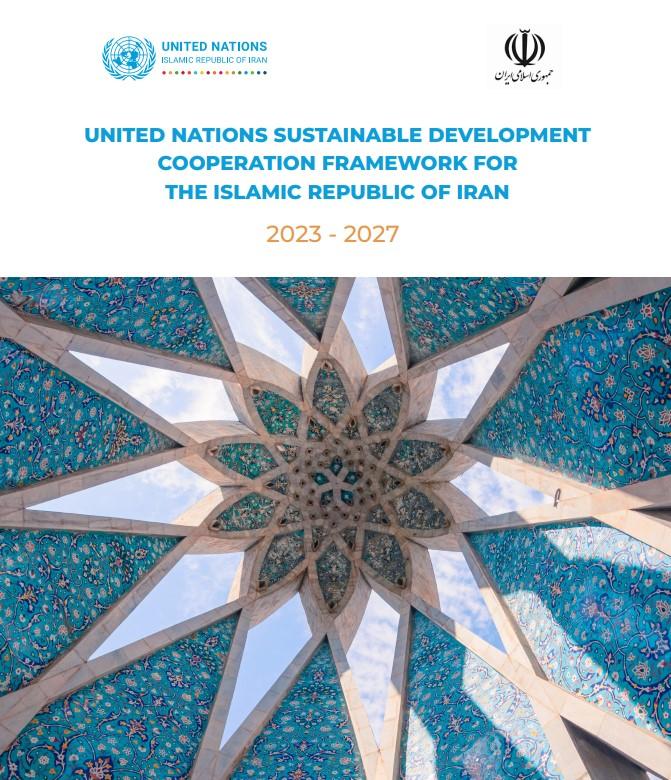
Publication
23 January 2023
United Nations Iran Country Results Report - 2021
This report lays out the UN’s collective contribution to Iran’s development and humanitarian goals, including under the current United Nations Development Assistance Framework (2017-2022).
1 of 4
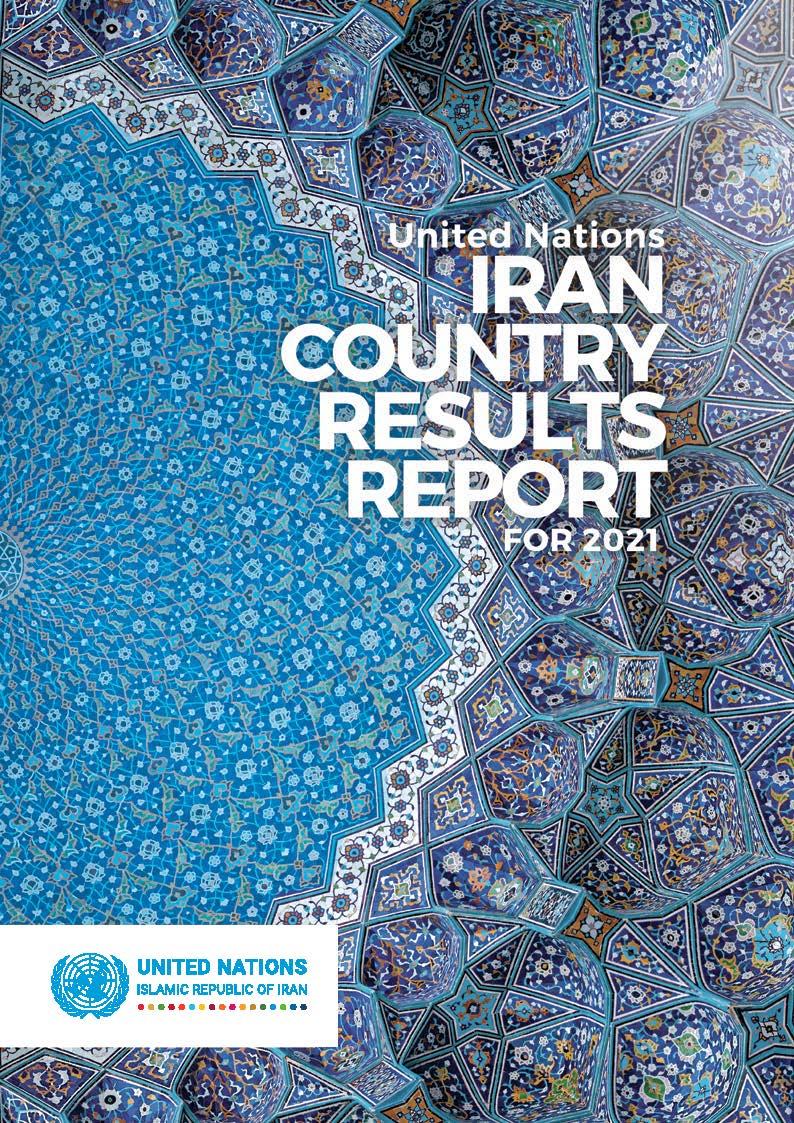
Publication
30 August 2021
UN Iran Country Results Report 2020
The UN Iran Country Results Report on behalf of the United Nations Country Team in the Islamic Republic of Iran, illustrates how, in 2020 the UN collectively supported Iran in achieving its national development and humanitarian goals. This support is provided as part of the United Nations Development Assistant Framework (UNDAF), a strategic and programmatic framework of cooperation between the UN and the Islamic Republic of Iran, currently in its fourth year (2017-2022).
1 of 4
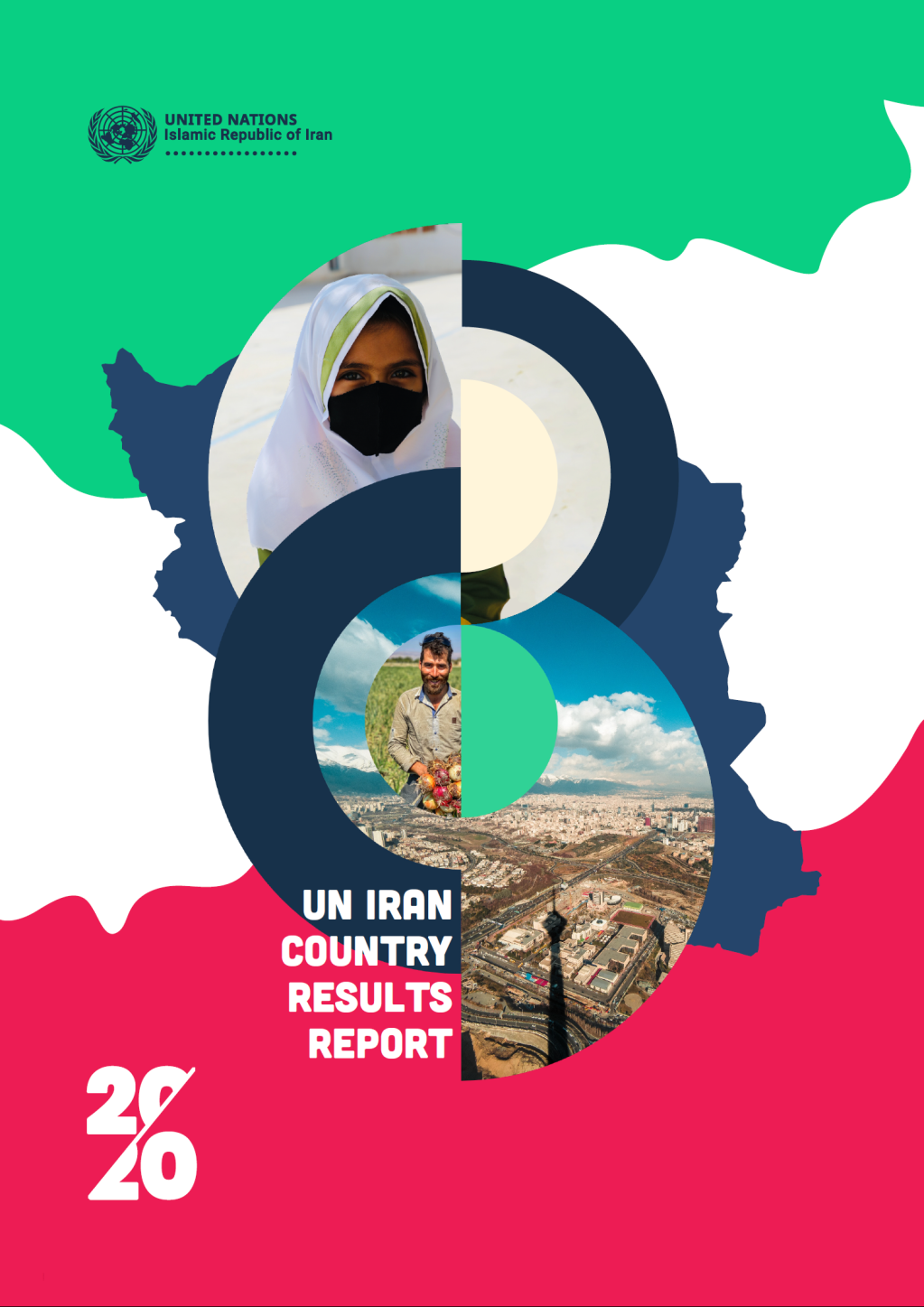
Publication
28 October 2020
UN Iran Country Results Report 2019
The UN Iran Country Results Report 2019 is prepared in line with the United Nations General Assembly Resolution 67/226 on the Quadrennial
Comprehensive Policy Review and Resolution 72/729 on repositioning of the UN Development System. It illustrates the collective results achieved
by the United Nations System in Iran during the course of 2019 in addressing the country’s national development and humanitarian priorities, alongside
national and international partners. This support is provided under the chapeau of the United Nations Development Assistance Framework (UNDAF)
2017-2021, which is a strategic and programmatic framework of cooperation between the United Nations and the Islamic Republic of Iran, with
priorities identified in line with the Government of Iran’s 6th Five-Year Economic, Cultural and Social Development Plan 2017-2021. The United Nations
humanitarian agencies operate outside the UNDAF based on their respective frameworks i.e. the Solutions Strategy for Afghan Refugees (SSAR)
for UNHCR, the Interim Country Strategic Plan (ICPS) for WFP, and IOM activities being guided by a Memorandum of Understanding signed with the
Government of Iran.
Comprehensive Policy Review and Resolution 72/729 on repositioning of the UN Development System. It illustrates the collective results achieved
by the United Nations System in Iran during the course of 2019 in addressing the country’s national development and humanitarian priorities, alongside
national and international partners. This support is provided under the chapeau of the United Nations Development Assistance Framework (UNDAF)
2017-2021, which is a strategic and programmatic framework of cooperation between the United Nations and the Islamic Republic of Iran, with
priorities identified in line with the Government of Iran’s 6th Five-Year Economic, Cultural and Social Development Plan 2017-2021. The United Nations
humanitarian agencies operate outside the UNDAF based on their respective frameworks i.e. the Solutions Strategy for Afghan Refugees (SSAR)
for UNHCR, the Interim Country Strategic Plan (ICPS) for WFP, and IOM activities being guided by a Memorandum of Understanding signed with the
Government of Iran.
1 of 4
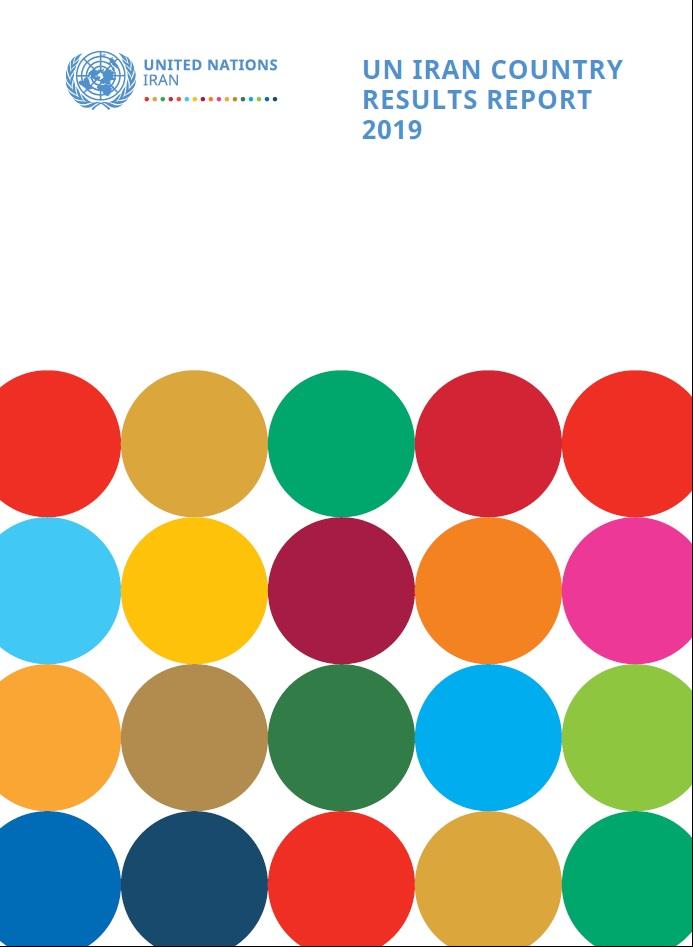
Story
24 July 2024
An environmental and culinary revival in Iran
Amidst the picturesque desert landscapes of Rigan in the Islamic Republic of Iran’s southeastern Kerman province, one community is witnessing a remarkable revival of its culinary tradition while upholding environmental sustainability.Such a transformation is the fruit of the Rehabilitation of Forest Landscapes and Degraded Lands (RFLDL) project, an initiative led by the Food and Agriculture Organization of the United Nations (FAO) and funded by the Global Environment Facility (GEF). The project has become a catalyst for economic empowerment and environmental conservation in Rigan, with local communities and rural women at its core.Known for its cultivation of dates, citrus, sesame and henna, Rigan nonetheless faces a significant threat from desertification. Characterized by its expansive plains and towering mountains, Rigan experiences temperatures that can soar above 50 degrees Celsius during the peak of summer. The area is dotted with date palms and citrus orchards that thrive in its more tropical zones.However, land degradation and biodiversity loss are acute, primarily due to unsustainable agricultural practices and deforestation. These issues are compounded by overgrazing, excessive harvests of forest products and the relentless movement of sands, all of which exacerbate wind erosion and diminish the efficacy of watershed ecosystems.In addition, communities have traditionally depended on wood and shrubs for fuel for their mud ovens, a practice that further led to deforestation and environmental degradation.As one of its responses, FAO’s RFLDL project distributed 750 gas ovens and 500 wood-efficient stoves, especially when compared to mud stoves, cutting down deforestation while helping the revival of the traditional Komaj bread making.Komaj bread, a delicacy infused with the sweetness of dates and aromatic cardamom, complemented by the earthy tones of cumin—a staple spice of the region—is at the heart of this revival.The switch to gas furnaces has enabled the women of Rigan to increase the production of Komaj bread, transforming it from a household staple to a source of income. This shift not only preserves a treasured culinary tradition but also provides new economic prospects for the community's women, who can sell their product at the local markets, further contributing to their economic resilience. Together with implementing activities, such as planting organic windbreakers, constructing watershed management structures and setting up sediment traps, the reduced necessity of clearing trees and bushes for fuel improved the status of dryland forests and range and decreased the severity of wind erosion on almost 75 000 hectares of land in both Rigan and South Khorasan.In Rigan, in particular, the project supported villages to restore 2 250 hectares of farm and rangeland by growing drought- and saline- resistant plants. 1 650 of these hectares were planted with species that can be safely irrigated by wastewater.The project actively involved locals in rehabilitating their ecosystem and implementing sustainable land management practices. Communities received training on the importance of conservation and were provided with the tools to engage in such practices.Furthermore, the project’s establishment of local microcredit funds reduced pressure on forest and natural resources. In an effort to diversify income sources away from solely forest products, the project encouraged the cultivation of alfalfa, date trees and medicinal plants, as well as the breeding of turkeys. Additionally, it supported a range of craft and artisan skills such as needlework, sewing, handicrafts and the spinning of palm fibres.Through technical training and knowledge dissemination, the RFLDL project ensured that its lessons and best practices reached a broad audience, fostering a culture of learning and adaptation. This educational component is vital for the sustainability of the project's outcomes, equipping community members with the skills needed to continue their conservation efforts. RFLDL has illuminated that environmental conservation and economic development are not mutually exclusive. The revival of Komaj bread making in Rigan stands as a symbol of this harmonious blend, showcasing how traditional practices can be reimagined to support both livelihoods and the planet.The critical role of women in promoting and contributing to sustainable development and the importance of integrating cultural heritage into conservation efforts is another testament of success. As Rigan's women bake their Komaj bread in gas furnaces, they are not just preserving a culinary tradition; they are leading the way in rural development, proving that even the simplest changes can lead to significant impacts.
1 of 5
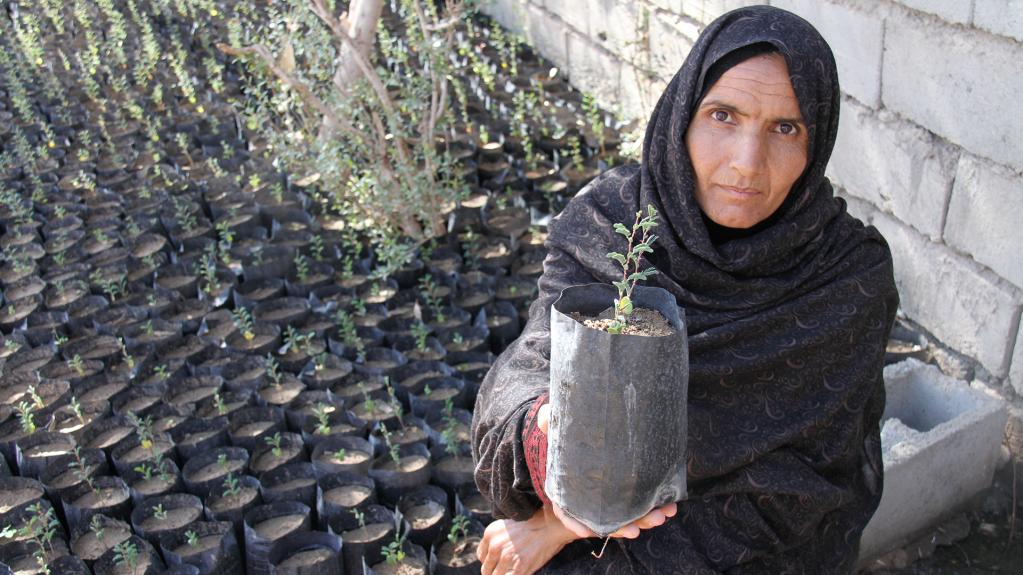
Story
21 July 2024
A transformative journey: Parisa's decades-long battle against HIV stigma and discrimination
Parisa's life was forever altered by HIV 25 years ago. The virus struck her family, snatching her husband's job and halting her child's education. Tragically, her husband passed away two years later, leaving Parisa to navigate the daunting landscape of loss and discrimination.“I did not have a clue about this illness. It was, in fact, the first time I had even heard the word 'AIDS'”.PARISAUndeterred by adversity, Parisa embarked on a relentless mission for human rights, determined to combat the pervasive stigma and discrimination surrounding HIV. Initially, she immersed herself in seminars and conferences, volunteering tirelessly at counselling centres, where she shared her own experiences to chip away at the stigma and discrimination.“My activities in the Positive Club allowed me to broaden my knowledge and take more effective steps toward raising public awareness, reducing HIV stigma and discrimination, and helping my peers… IRCHA and UNAIDS supported me to expand my knowledge and gave me the chance to exchange my experiences with the members of Positive Clubs in and out of the country.”PARISA Her unwavering dedication caught the attention of Dr Minoo Mohraz, the former director of the Iranian Research Centre for HIV/AIDS (IRCHA), who offered her a pivotal role in a Positive Club—a sanctuary for those grappling with similar challenges. Thus began Parisa's transformative journey, marked by a series of initiatives aimed at raising awareness, eradicating stigma and discrimination, and supporting her peers. WHAT IS THE POSITIVE CLUB INITIATIVE? The Positive Club is a meeting place for people living with HIV, who run the club themselves, with supervision from Parisa and colleagues. At the club, people receive training in arts, and sports, and as peer educators. The Positive Club initiative was one of the successful programmes aimed at promoting positive health, dignity, and HIV prevention; it has been running for over 12 years with support from UNAIDS in collaboration with national partners and civil society organizations. Through this initiative, over 10,000 people living with HIV have been supported across 25 Positive Clubs, empowering them through training classes, workshops on HIV prevention, care and treatment, counselling sessions, and psychosocial support.Over the years, Parisa's efforts have been nothing short of extraordinary. From managing a Positive Club in Tehran to representing people living with HIV in various influential platforms, including Iran's Country Coordinating Mechanism, its Oversight Committee, and Global Fund, she has been a relentless advocate for change. Her initiatives have spanned diverse arenas, from radio shows and collaborations with filmmakers to training workshops for religious leaders and healthcare providers. Parisa's impact reverberates across borders, as she leverages regional platforms like MENA Rosa --the first regional network dedicated to women living with HIV in the Middle East and North Africa-- to exchange experiences and champion global efforts against HIV stigma and discrimination with a particular focus on Women living with and affected by HIV.Amid the COVID-19 pandemic, Parisa's compassion for people living with and affected by HIV was once again evident. She mobilized support networks to provide essential supplies for Positive Club members and vulnerable families, ensuring that the crisis does not exacerbate the challenges faced by PLHIV.Reflecting on the progress made over the last 25 years, Parisa acknowledged the remarkable strides in combating HIV-related stigma and discrimination. Efforts to eliminate HIV-related stigma and discrimination have been led by the UNAIDS Country Office for Iran, alongside national partners of the AIDS Control Programme. Notably, the first PLHIV Stigma Index study, conducted in 2010, laid the foundation for understanding the landscape of stigma in Iran. Subsequently, a second PLHIV Stigma Index study, was carried out by the network of PLHIV in collaboration with UNAIDS, Global Network of PLHIV (GNP+), International Community of Women Living with HIV (ICW), Johns Hopkins Medical University (JHMU), National AIDS Programme (NAP), and with financial support from Global Fund to Fight AIDS, Tuberculosis and Malaria (GFATM) /UNDP. Parisa played an important role in implementing the Stigma Index 2.0 which provided updated insights.COMPARING OF BOTH OF IRAN’S STIGMA INDEX STUDIES A comparison between the two Stigma Index studies conducted ten years apart, using updated methodologies, revealed promising changes. The prevalence of self-stigma among PLHIV decreased significantly from 80% to 40%. Similarly, the percentage of PLHIV refraining from seeking medical help has decreased from 80% to 19%, underscoring improved accessibility to healthcare services and increased health-seeking behaviour among affected individuals. Overall, reports of stigma and discrimination have decreased from 71% to 47%, reflecting tangible improvements in societal attitudes to HIV.Parisa reflects on these notable shifts in HIV-related Stigma observed between the two studies. In the initial Stigma Index conducted a decade ago, internal stigma was predominant among PLHIV, followed by societal and healthcare provider stigma. However, in the subsequent study, internal stigma was significantly reduced, while stigma and discrimination from healthcare providers emerged as the most prevalent issue. The improvement observed in internal stigma among PLHIV could be partly attributed to the work of the empowering Positive Clubs. Additionally, this improvement highlights the importance of ongoing efforts to address stigma and discrimination comprehensively, with a particular focus on healthcare settings. By acknowledging these shifts and persisting in their efforts, UNAIDS Iran, Parisa and her colleagues remain committed to building a future free from the burdens of HIV-related stigma and discrimination.Through her nearly two decades of hotline counselling experience, Parisa has witnessed a shift in attitudes, with increased awareness and openness surrounding HIV discourse. She credits grassroots campaigns and community-led initiatives for driving this transformation, paving the way for a more inclusive society.“Positive Clubs have been played a very effective role in empowerment and phycological support to the members and reducing stigma and discrimination.”PARISAIn 2019, Iran joined the Global Partnership to Eliminate all forms of HIV-related stigma and discrimination, prioritizing a strong emphasis on interventions within communities, emergency/humanitarian settings, and healthcare facilities. With support from UNAIDS, protocols and training packages were developed to address stigma and discrimination in these critical areas. These efforts were carried out in close collaboration with national partners and civil society organizations, with training workshops being a key component of the initiative.
OVERVIEW OF GLOBAL PARTNERSHIP The Global Partnership for action to eliminate all forms of HIV-related stigma and discrimination is a critical vehicle for action to mobilise all countries to reach the political declaration and Global AIDS Strategy targets. It leverages partnerships to enhance coordination of interventions and funding; it provides knowledge and evidence-guided technical support; and increases accountability mechanisms and community leadership.
Parisa was actively involved in the implementation phase of these projects. Her contributions have been instrumental in advancing the work to eradicate HIV-related stigma and discrimination across humanitarian, healthcare, and community settings.However, Parisa acknowledges the persistent challenges faced by PLHIV, from sporadic bouts of self-doubt to occasional rejections and the lingering shadows of depression and fear. Despite these hurdles, she remains steadfast in her belief that we can achieve a future free from stigma and discrimination.As Parisa continues her tireless advocacy, her journey stands as a testament to the resilience of the human spirit and the power of collective action in fostering a world where every individual, regardless of their HIV status, is embraced with dignity and compassion. “Of course, people living with HIV still experience stigma and discrimination at different stages of their lives but have a hope for a day free of stigma and discrimination.”PARISAUNAIDS has played a pivotal role in the establishment and sustained operation of Positive Clubs for over a decade, catalyzing transformative changes in the lives of people living with HIV such as Parisa and in the fight against stigma and discrimination. Nonetheless, the journey towards eliminating stigma and discrimination remains unfinished, albeit considerably smoother and more steadfast with the collaborative efforts and political commitment of initiatives such as the Global Partnership. “Together, we continue to pave the way towards a future free from the burdens of stigma and discrimination for all individuals living with and affected by HIV.”PARISA
OVERVIEW OF GLOBAL PARTNERSHIP The Global Partnership for action to eliminate all forms of HIV-related stigma and discrimination is a critical vehicle for action to mobilise all countries to reach the political declaration and Global AIDS Strategy targets. It leverages partnerships to enhance coordination of interventions and funding; it provides knowledge and evidence-guided technical support; and increases accountability mechanisms and community leadership.
Parisa was actively involved in the implementation phase of these projects. Her contributions have been instrumental in advancing the work to eradicate HIV-related stigma and discrimination across humanitarian, healthcare, and community settings.However, Parisa acknowledges the persistent challenges faced by PLHIV, from sporadic bouts of self-doubt to occasional rejections and the lingering shadows of depression and fear. Despite these hurdles, she remains steadfast in her belief that we can achieve a future free from stigma and discrimination.As Parisa continues her tireless advocacy, her journey stands as a testament to the resilience of the human spirit and the power of collective action in fostering a world where every individual, regardless of their HIV status, is embraced with dignity and compassion. “Of course, people living with HIV still experience stigma and discrimination at different stages of their lives but have a hope for a day free of stigma and discrimination.”PARISAUNAIDS has played a pivotal role in the establishment and sustained operation of Positive Clubs for over a decade, catalyzing transformative changes in the lives of people living with HIV such as Parisa and in the fight against stigma and discrimination. Nonetheless, the journey towards eliminating stigma and discrimination remains unfinished, albeit considerably smoother and more steadfast with the collaborative efforts and political commitment of initiatives such as the Global Partnership. “Together, we continue to pave the way towards a future free from the burdens of stigma and discrimination for all individuals living with and affected by HIV.”PARISA
1 of 5

Story
10 July 2024
Enhancing medical safety
In a move to strengthen Iran’s national healthcare waste management capabilities, the recent acquisition of high-tech autoclaves has marked a significant step forward. These advanced machines, capable of using high-pressure steam to sterilize and shred medical waste, were introduced amidst the soaring demand for safe waste disposal methods heightened by the COVID-19 pandemic.At that time, traditional chemical-based methods started to phase out in favor of more sustainable, effective technologies. According to the national health protocols, a staggering number of 120 autoclaves were deemed necessary to safely manage the medical waste in the country. To date, with the support from UNDP as the Principal Recipient of the Global Fund grant, seven autoclaves have been acquired. The autoclaves were strategically installed across the country in hospitals in Fars, East Azerbaijan, Kurdistan, Khuzestan, and Tehran provinces. These facilities were chosen to ensure a broad geographical distribution benefiting both rural and urban populations. Partnerships have been vital in this endeavor. A collaborative network including the Ministry of Health and Medical Education (MoHME) and several top universities including Shahid Beheshti in Tehran as well as Ahwaz, Kurdistan, Shiraz, and Tabriz Universities has been integral to ensuring due acquisition accompanied by adequate training and support, guaranteeing sustainable use of the autoclaves. As the next steps, detailed guides on the operation and maintenance of these machines will be distributed ensuring long-term and successful utilization.The result can be transformative. By implementing these advanced machines, the national health system can significantly enhance its capacity to manage medical waste. This development helps to control the spread of infectious diseases, especially critical during pandemic surges, and aligns with the international environmental standards, marking a leap toward more sustainable healthcare practices.
1 of 5
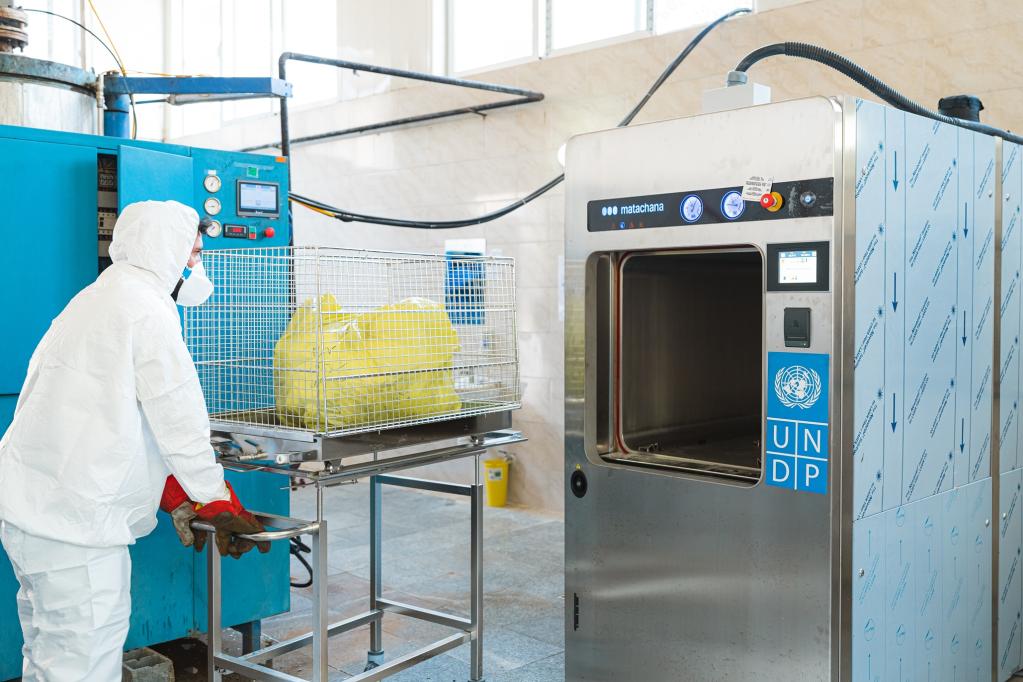
Story
27 June 2024
UNODC World Drug Report 2024: Harms of world drug problem continue to mount amid expansions in drug use and markets
The emergence of new synthetic opioids and a record supply and demand of other drugs has compounded the impacts of the world drug problem, leading to a rise in drug use disorders and environmental harms, according to the World Drug Report 2024 launched by the UN Office on Drugs and Crime (UNODC) today.“Drug production, trafficking, and use continue to exacerbate instability and inequality, while causing untold harm to people’s health, safety and well-being,” said Ghada Waly, Executive Director of UNODC. “We need to provide evidence-based treatment and support to all people affected by drug use, while targeting the illicit drug market and investing much more in prevention.”The number of people who use drugs has risen to 292 million in 2022, a 20 per cent increase over 10 years. Cannabis remains the most widely used drug worldwide (228 million users), followed by opioids (60 million users), amphetamines (30 million users), cocaine (23 million users), and ecstasy (20 million users).Nitazenes – a group of synthetic opioids which can be even more potent than fentanyl – have recently emerged in several high-income countries, resulting in an increase in overdose deaths. Though an estimated 64 million people worldwide suffer from drug use disorders, only one in 11 is in treatment. Women receive less access to treatment than men, with only one in 18 women with drug use disorders in treatment versus one in seven men.In 2022, an estimated 7 million people were in formal contact with the police (arrests, cautions, warnings) for drug offences, with about two-thirds of this total due to drug use or possession for use. In addition, 2.7 million people were prosecuted for drug offences and over 1.6 million were convicted globally in 2022, though there are significant differences across regions regarding the criminal justice response to drug offences.The Report includes special chapters on the impact of the opium ban in Afghanistan; synthetic drugs and gender; the impacts of cannabis legalization and the psychedelic “renaissance”; the right to health in relation to drug use; and how drug trafficking in the Golden Triangle is linked with other illicit activities and their impacts. Drug trafficking is empowering organized crime groupsDrug traffickers in the Golden Triangle are diversifying into other illegal economies, notably wildlife trafficking, financial fraud, and illegal resource extraction. Displaced, poor, and migrant communities are suffering the consequences of this instability, sometimes forced to turn to opium farming or illegal resource extraction to survive, falling into debt entrapment with crime groups, or using drugs themselves.These illicit activities are also contributing to environmental degradation through deforestation, the dumping of toxic waste, and chemical contamination.Consequences of cocaine surgeA new record high of 2,757 tons of cocaine was produced in 2022, a 20 per cent increase over 2021. Global cultivation of coca bush, meanwhile, rose 12 per cent between 2021 and 2022 to 355,000 hectares. The prolonged surge in cocaine supply and demand has coincided with a rise in violence in states along the supply chain, notably in Ecuador and Caribbean countries, and an increase in health harms in countries of destination, including in Western and Central Europe.Impact of cannabis legalizationAs of January 2024, Canada, Uruguay, and 27 jurisdictions in the United States had legalized the production and sale of cannabis for non-medical use, while a variety of legislative approaches have emerged elsewhere in the world.In these jurisdictions in the Americas, the process appears to have accelerated harmful use of the drug and led to a diversification in cannabis products, many with high-THC content. Hospitalizations related to cannabis use disorders and the proportion of people with psychiatric disorders and attempted suicide associated with regular cannabis use have increased in Canada and the United States, especially among young adults.Psychedelic “renaissance” encourages broad access to psychedelicsThough interest in the therapeutic use of psychedelic substances has continued to grow in the treatment of some mental health disorders, clinical research has not yet resulted in any scientific standard guidelines for medical use.However, within the broader “psychedelic renaissance”, popular movements are contributing to burgeoning commercial interest and to the creation of an enabling environment that encourages broad access to the unsupervised, “quasi-therapeutic” and non-medical use of psychedelics. Such movements have the potential to outpace the scientific therapeutic evidence and the development of guidelines for medical use of psychedelics, potentially compromising public health goals and increasing the health risks associated with the unsupervised use of psychedelics.Implications of opium ban in AfghanistanFollowing the drastic decrease of Afghanistan’s opium production in 2023 (by 95 per cent from 2022) and an increase in production in Myanmar (by 36 per cent), global opium production fell by 74 per cent in 2023. The dramatic contraction of the Afghan opiate market made Afghan farmers poorer and a few traffickers richer. Long-term implications, including on heroin purity, a switch to other opioids by heroin users, and/or a rise in demand for opiate treatment services may soon be felt in countries of transit and destination of Afghan opiates.Right to health for people who use drugsThe report outlines how the right to health is an internationally recognized human right that belongs to all human beings, regardless of a person’s drug use status or whether a person is imprisoned, detained or incarcerated. It applies equally to people who use drugs, their children and families, and other people in their communities.* *** *For further information, please visit:World Drug Report 2024 homepage
1 of 5
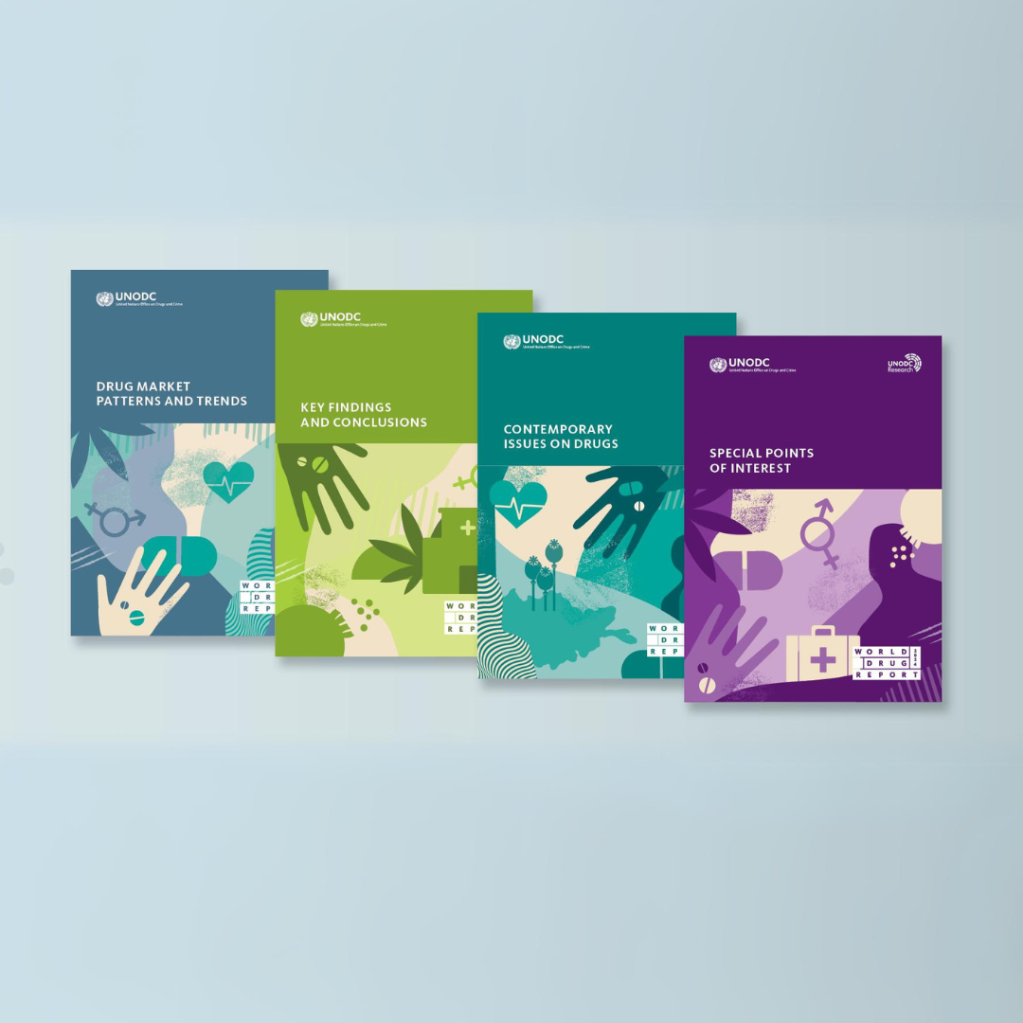
Story
24 June 2024
UN-Habitat Partners with Iran to Improve the Resilience of Hospitals and Urban Critical Facilities Against Natural Disasters
UN-Habitat has been actively involved in assisting the government of the Islamic Republic of Iran to develop comprehensive Risk Reduction Plans and implement vulnerability reduction activities. During the 2017, M7.2 earthquake in Kermanshah, west of Iran, several hospitals and healthcare facilities suffered severe damage, resulting in their malfunction during crisis, when most needed. This was also observed during previous natural disasters in the country, e.g. Bam, 2003 and Manjil, 1990 earthquakes as well as recent floods. Failure of the hospitals and healthcare facilities in crises increased the number of casualties as injured people were treated in tents and had to be transferred to farther centers to receive advanced medical treatments. In response to recuring damage to healthcare facilities during natural disasters and in a concerted effort to bolster the country's medical facilities against the ravages of natural hazards, UN-Habitat, in partnership with the Government of the Islamic Republic of Iran and supported by the Government of Japan, launched the Project "Emergency Support for Safer Hospitals and Settlements" project in 2021.The Project was implemented in cooperation with the Executive Organization for Government and Public Buildings and Infrastructure (EOGPBI) and the Roads, Housing and Urban Development Research Center (BHRC), under the Ministry of Roads and Urban Development. It also involved a steering committee with members from various governmental organizations. A comprehensive Disaster Risk Reduction Management (DRRM) approach was employed for this purpose to I) identify the vulnerabilities and risk of target healthcare facilities and II) take the required actions for treating the identified challenges. Various elements required for an integrated earthquake DRRM in Hospitals were developed and implemented within the pilot activities.A comprehensive Disaster Risk Reduction Management (DRRM) approach was employed for this purpose to I) identify the vulnerabilities and risk of target healthcare facilities and II) take the required actions for treating the identified challenges. Various elements required for an integrated earthquake DRRM in Hospitals were developed and implemented within the pilot activities. Several consulting engineering companies from private sector implemented the studies on 11 large hospitals in the country under the technical supervision of a Technical Working Group (TWG) composed of UN-Habitat, experienced university professors, and representatives from the IPs, impacting around 380,000 square meters of health facilities and covering over 4,000 hospital beds nationwide, with an appropriate distribution all over the country. The Project was designed so that a broad range of community groups including elderly, people with disability, women and children can benefit from the project results as the beneficiaries of the hospitals. The initiative also facilitated fostering the skill and knowledge for retrofitting vulnerable hospitals by constructing model retrofits in key locations. A broad spectrum of engineers and site technicians from consulting companies and contractors were involved in the activities to provide retrofitting samples in two large hospitals. During the construction of role models, 110 vulnerable points in the piping system were retrofitted by 236 flexible joint pieces. The activity also included improving 85 vulnerable infill walls and improving the support of mechanical system using 267 prefabricated modular support frames. These all were supported with a strong technical supervision of TWG who together with UN-Habitat developed the required guidelines and technical instructions in the field of the Project, trained the experts, developed software system for the Disaster Risk Management of hospitals and involved in the 2nd international Conference of Hospitals and Urban Critical Facilities held by UN-Habitat in Iran. Development of a national guideline approved and published by PBO, issuing technical order-notes by EOGPBI to all the consulting companies and contractors of hospitals in the country to follow the achievements of the Project in other hospital projects nation-wide, as well as a multi-stakeholder approach for implementing the Project can ensure the sustainability of the Project achievements after ending and upscaling the results to other activities and projects.By leveraging the technical and engineering capacities and incorporating international experiences the Project received commendation from the government, academia, and the private sector for its contributions to strengthening Iran's healthcare system against natural disasters. In this regard Ali Sobati, the general manager of engineering affairs and new technologies of the EOPGBI said: “Based on the Project’s results, we have considered methodological changes both in design, implementation and use of innovative technologies in the field of Hospital constructions”.Also, Professor A. Aghakouchak, a university faculty states: “The BEHTAB Phase-II project, which was carried out in cooperation with UN-Habitat, is a very valuable project related to hospitals in the country. In this plan, a large group of academic professors cooperated in technical guidance as well as the main consultants of the country, which will certainly improve technical knowledge and experience in the country, and in the future, its results will be used in the modification of the regulations and methods of analysis and design of hospitals.”
1 of 5
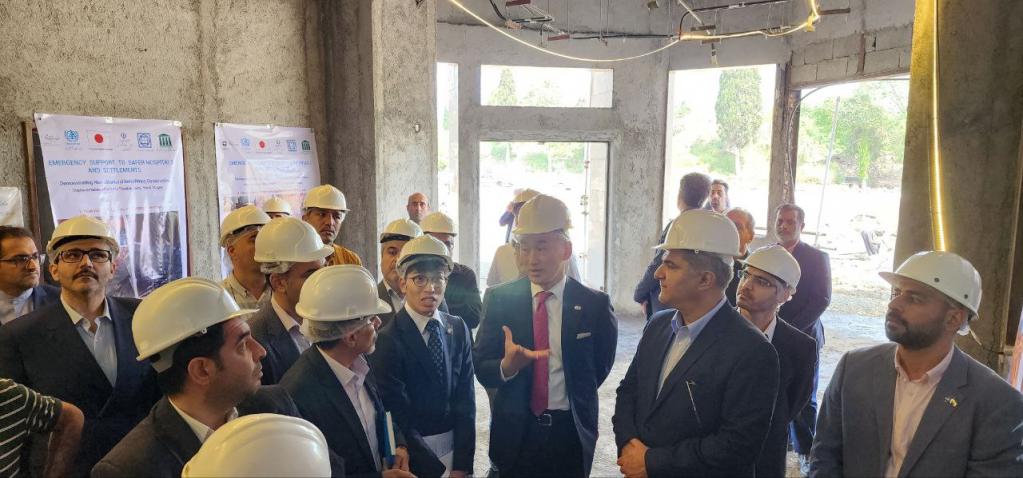
Press Release
10 June 2024
The World Food Programme receives €1.5 million contribution from the EU to support refugees in Iran
WFP has been committed to providing essential assistance to vulnerable communities worldwide. This partnership with the EU marks a crucial step in enhancing the living conditions of refugees in Iran. The funds will enable WFP to provide refugees with cash assistance, ensuring they have access to the necessary resources to meet their basic needs."We are incredibly grateful to the European Union for their continued support and generosity," said WFP Representative in Iran a.i Maysaa Alghribawy. "This contribution will have a profound impact on the lives of thousands of refugees, providing them with the dignity and autonomy to make choices that best suit their needs."The cash-based transfer programme is designed to empower refugees by giving them the flexibility to buy food and other essential items according to their individual preferences. This approach supports both refugee communities and local markets, especially local producers and small enterprises.The contribution from the EU is a testament to the importance of international cooperation in addressing humanitarian crises. By joining forces, we can make a tangible difference in the lives of those affected by displacement and ensure that no one is left behind.WFP and EU remain steadfast in their commitment to providing life-saving assistance and support to the most vulnerable refugees. This contribution underscores the shared dedication to humanitarian principles and the pursuit of a world with Zero Hunger. # # #
The United Nations World Food Programme is the world’s largest humanitarian organization saving lives in emergencies and using food assistance to build a pathway to peace, stability, and prosperity for people recovering from conflict, disasters, and the impact of climate change.
Follow us on X, formerly Twitter, via @wfp_media, @wfpiran
For more information please contact (email address: firstname.lastname@wfp.org):
Dara Darbandi, WFP/ Iran, Mob. +98 912 308 4147
The United Nations World Food Programme is the world’s largest humanitarian organization saving lives in emergencies and using food assistance to build a pathway to peace, stability, and prosperity for people recovering from conflict, disasters, and the impact of climate change.
Follow us on X, formerly Twitter, via @wfp_media, @wfpiran
For more information please contact (email address: firstname.lastname@wfp.org):
Dara Darbandi, WFP/ Iran, Mob. +98 912 308 4147
1 of 5
Press Release
28 December 2023
Safeguarding biodiversity: FAO, Iran success in securing Bactrian Camels future
In the pursuit of preserving the Bactrian camel, a species listed as "Critically Endangered" by the IUCN, FAO initiated a project two years ago to provide technical support for preservation of Bactrian camel through enhancing both in-situ and ex-situ conservation. Various training courses empowered camel owners, experts, veterinarians and scientists.
“Simultaneously, enhancing the livelihoods of local herders, capacity building, and raising awareness among society and policymakers play a crucial role in the sustainability of such projects. Our commitment to protect this valuable species has been realized in close cooperation with the Ministry of Agricultural Jahad,” GC stated.
Referring to the challenges faced during the implementation phase, he mentioned main achievements of the project including, the establishment of the first germplasm hub for Bactrian camels in Iran at the Jafar Abad station, capacity-building programs for government experts and camel herders through national and international training programs, empowering the newly established cooperative company by procuring feeding equipment as well as facilitating a wool processing workshop.
Moreover, he pointed out some other achievements such as microchipping of Bactrian camels, providing nutritional supplements, vaccines, and medicines coupled with the customization of the Sareban Yar application for performance recording.
“We have embraced advanced reproductive technologies, such as the cryopreservation of genetic materials from Bactrian camels. In a groundbreaking initiative, we have also attempted embryo transfer,” he further highlighted.
He expressed trust that the government will continue its efforts to conserve this valuable species, building on the work which has been modelled jointly by FAO in this project.
1 of 5
Press Release
26 December 2023
WHO, Iran’s health ministry advance environmental and social standards in the Iranian public health sector under World Bank collaboration
This huge achievement is part of the Iran COVID-19 Emergency Response Project – Additional Financing (ICERP-AF), a joint venture by the Government of the Islamic Republic of Iran, World Bank and WHO. Initiated in January 2022 with a €76.1 million loan agreement, the project seeks to improve access to life-saving medical equipment and services across the country.
Facilities were classified as green (compliant), yellow (tolerable), brown (conditional) or red (rejected) based on their compliance with the defined standards. Following the assessments, significant improvements were made in areas such as buildings, patient safety, radiation protection, social aspects, staff health, supervisory mechanisms, safety of workplace, and waste management.
The ICERP-AF Stakeholder Engagement Plan, a key component of the project, achieved another major milestone by defining an approach to consultation, information disclosure and grievance redress that is culturally and technically appropriate. This approach actively engages relevant stakeholders, fostering an atmosphere of understanding and facilitating decision-making. Stakeholders can voice opinions and concerns by calling a dedicated 24/7 hotline at 190(8) or by emailing: icerp@behdasht.gov.ir
Dr Syed Jaffar Hussain, WHO Representative and Head of Mission to the Islamic Republic of Iran, said: “This collaborative effort underscores our commitment to elevating environmental and social standards in Iran's public health sector. The positive outcomes achieved through ICERP-AF will contribute to a safer and more resilient health infrastructure, benefiting both health care providers and the communities they serve.”
Under ICERP-AF, WHO has played a pivotal role in advancing the status of environmental and occupational health and patient safety in designated hospitals and laboratories across Iran. To achieve this, WHO has worked with the Economic Coordination Center of the Ministry of Health and Medical Education. The joint effort is a significant step towards building a more robust and sustainable health system in the country.
Facilities were classified as green (compliant), yellow (tolerable), brown (conditional) or red (rejected) based on their compliance with the defined standards. Following the assessments, significant improvements were made in areas such as buildings, patient safety, radiation protection, social aspects, staff health, supervisory mechanisms, safety of workplace, and waste management.
The ICERP-AF Stakeholder Engagement Plan, a key component of the project, achieved another major milestone by defining an approach to consultation, information disclosure and grievance redress that is culturally and technically appropriate. This approach actively engages relevant stakeholders, fostering an atmosphere of understanding and facilitating decision-making. Stakeholders can voice opinions and concerns by calling a dedicated 24/7 hotline at 190(8) or by emailing: icerp@behdasht.gov.ir
Dr Syed Jaffar Hussain, WHO Representative and Head of Mission to the Islamic Republic of Iran, said: “This collaborative effort underscores our commitment to elevating environmental and social standards in Iran's public health sector. The positive outcomes achieved through ICERP-AF will contribute to a safer and more resilient health infrastructure, benefiting both health care providers and the communities they serve.”
Under ICERP-AF, WHO has played a pivotal role in advancing the status of environmental and occupational health and patient safety in designated hospitals and laboratories across Iran. To achieve this, WHO has worked with the Economic Coordination Center of the Ministry of Health and Medical Education. The joint effort is a significant step towards building a more robust and sustainable health system in the country.
1 of 5
Press Release
20 December 2023
UN Iran holds art exhibition with participation of 35 countries
The exhibition is currently on display at the Niavaran Cultural-Historic Complex’s Blue Hall of Tehran, until 17 December. The initiative brings together pieces of art and cultural heritage of 35 countries from across the world, including from Iran. Besides country contributions, it also showcases photographs of selected gifts to the United Nations’ Headquarters in New York.
Innagurated on 7 December, 2023, the exhibition is one of the initiatives organized by the United Nations in the Islamic Republic of Iran to mark the UN Day in the country.
Guided by the spirit of the UN Charter, the three interconnected themes of this exhibition - Humanity, Solidarity and One Planet - underline that, despite the diversity of humankind, we should be united among us and stand in the defense of our one planet.
The exhibition is open to the public every day, from 10:00 to 16:00, until Sunday, 17 December, 2023.
Speaking at the innagural ceremony, the UN Resident Coordinator, Mr. Stefan Priesner, extended his gratitude towards the participating countries for the support in organizing this exhibition.
Mr. Priesner said: “I believe that this exhibition is unique. Because of its theme that recalls the core principles of the United Nations based on the UN Charter, which is a singular document in history. It reminds us that despite our differences, we all belong to the same family called Humanity, which is the basis for human rights. It is also based on the principle of Solidarity so that no country and no person is left behind. And last but not least, it calls on us to protect this precious One and only planet that we all call our home.”
“Today, through this exhibit, we wish to open a window to stories from all corners of the world for the people of Iran. This is important because the UN is not only a forum of countries and governments, it is a confluence of peoples,” added the UN Resident Coordinator.
The countries participating in this exhibition included Australia, Austria, Bolivia, Brunei Darussalam, Bulgaria, Chile, China, Cote D’Ivoire, Croatioa, Finland, Holy See (Vatican), Hungary, India, Iran, Italy, Japan, Kazakhstan, Kuwait, Kyrgyzstan, Malaysia, Mexico, Norway, Pakistan, Philippines, Republic of Korea, Romania, Russia, Slovakia, Spain, Sri Lanka, Switzerland, Ukraine, Venezuela, Yemen and Zimbabwe.
This exhibition was organized by the United Nations in the Islamic Republic of Iran, with the support of the Nivaran Cultural-Historic Complex, and the Ministry of Cultural Heritage, Tourism and Handicrafts.
--- End ---
11 December 2023
***********************
For further information please contact United Nations Information Centre (UNIC) in Tehran:
+989121053220
Unic-tehran@un.org
1 of 5
Press Release
09 November 2023
WHO Strengthens Emergency Response Capacity in Iran’s Khoy Region with Life-Saving Equipment and Supplies
On 28 January 2023, at 21:44 local time, a devastating magnitude 5.9 earthquake struck Khoy, leaving more than 1,445 people injured and causing significant damage to the region. In response to the government’s request for assistance, WHO immediately took action by participating in a multisectoral UN inter-agency mission to assess the situation, understand the needs of the affected population, and coordinate an immediate joint UN response.
Recognizing the urgent public health needs of the earthquake-affected population, WHO has embarked on a crucial mission to provide life-saving equipment and supplies to health facilities in Khoy and surrounding areas. The goal is to support health facilities accommodating earthquake-affected patients and those with limited access to healthcare due to damages caused by the earthquake.
To achieve this objective, WHO has procured and donated essential medical equipment, including two mechanical ventilators to assist patients requiring breathing support, one trauma and emergency surgery kit (TESK) to provide vital trauma care and three portable automated external defibrillators (AEDs) to aid in cardiac life support.
“This initiative reflects WHO’s dedication to its mission of promoting global health and responding to emergencies promptly and effectively. The Organization remains committed to working closely with local authorities and partners to enhance resilience and preparedness in the face of future disasters,” said Dr Syed Jaffar Hussain, WHO Representative and Head of Mission to the Islamic Republic of Iran.
“These critical resources are envisioned to not only save lives but also prevent mortality and morbidity in the region,” Dr Hussain underscored.
The direct beneficiaries of this project are estimated to be 3,440 individuals, while an additional 150,000 people will indirectly benefit from the strengthened emergency response capacity in the region. The support provided by WHO, in collaboration with CERF, underscores the commitment to ensuring the well-being and health of the affected population in times of crisis.
1 of 5
Latest Resources
1 / 11
Resources
18 April 2024
Resources
07 February 2023
1 / 11

